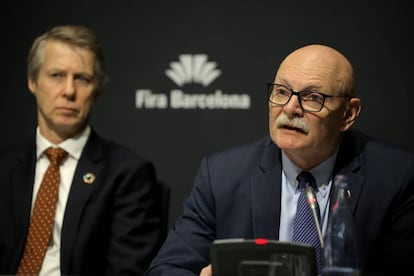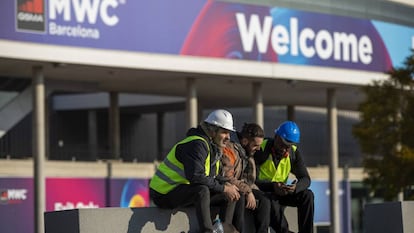Mobile World Congress organizers cite ‘force majeure’ for cancellation
Postponement or a smaller event were also on the table, says GSMA group, which was forced to take the drastic decision on Wednesday given the stream of firms pulling out over coronavirus fears

“A case of force majeure.” That was the argument presented on Thursday by GSMA, the industry group that organizes Barcelona’s Mobile World Congress (MWC), for the cancellation of the tech innovation showcase, given the series of cancellations by major firms over fears related to the novel coronavirus, officially named Covid-19 by the World Health Organization (WHO).
The decision to not go ahead with the most important telephony fair in the world, which was due to be held between February 24 and 27 in the Catalan capital, could lead to a series of claims by companies who were planning to participate.
In the wake of the decision to cancel, the GSMA will try to reduce the costs of the compensation it will have to pay out
“It has been impossible to hold this event for reasons of force majeure,” explained the general director of GSMA, Mats Granryd, at a press conference in Barcelona on Thursday. In the wake of the decision to cancel, the GSMA will try to reduce the costs of the compensation it will have to pay out for an event that attracts 2,800 companies and that generates income for the city of Barcelona of nearly €500 million.
Granryd went on to say that, despite the fact that Barcelona is prepared to cope with a health challenge like the coronavirus, there were “many statements from the European Center for the Prevention and Control of diseases and from other institutions” that backed the GSMA’s decision. Experts consulted by EL PAÍS said that they thought that citing “force majeure” will indeed allow GSMA to minimize the compensation it will have to pay out.
The president of the Fira convention center, where the MWC was due to take place, said on Thursday that “neither Barcelona, nor Catalonia, nor Spain” are in the risk zone for the coronavirus, which originated in the Chinese city of Wuhan. This argument has been repeated by political and health authorities during the whole week.
The organizers were considering cancellation from the start of the week, as major firms including LG, Cisco, Intel, Facebook and McAfee began to pull out
For the last few days, there were several different options on the table for GSMA, including the reduction of the size of the trade fair or its postponement. The head of organization for the MWC, John Hoffman, explained on Thursday that a smaller format was originally planned. “But our buyers told us that they wouldn’t come,” he said.
As for postponing the yearly event, he said it was “impossible to know when this situation would conclude,” in reference to the ongoing epidemic, which by Wednesday was reported to have killed nearly 1,400 people and infected around 60,000. Other sources told EL PAÍS that the organizers were considering cancellation from the start of the week, as major firms including LG, Cisco, Intel, Facebook and McAfee began to pull out, but they needed a legal basis to do so in order to avoid compensation claims being filed.
The financial consequences of the decision to cancel this year’s MWC will run into the millions of euros for a trade fair that was expecting to attract more than 100,000 people from 2,800 companies. Organizers of the MWC estimate that the trade fair brings around €492 million to the city of Barcelona through hotel reservations, restaurant meals, taxi rides, event staff and more. Last year, the MWC created 13,000 temporary jobs.
Risk of “legal chaos”

The economic losses from the suspension of the Mobile World Congress are already running into the millions of euros. But who is going to compensate the affected parties? Legal experts consulted by EL PAÍS say that the key will be determining whether or not the cancellation of the tech fair is due to “force majeure” – i.e. the ongoing outbreak of the novel coronavirus.
The organizers of the event, GSMA, said on Wednesday that the cancellation was due to the “global fears” about the virus. While it is true that the World Health Organization (WHO) has declared an international emergency due to the epidemic, the organization has advised against restrictions on the movement of people or goods outside of China.
What’s more, in Spain, no exceptional measures have been put in place given that only two cases have been detected so far (both imported) and no contagion has occurred on Spanish territory. Health Minister Salvador Illa repeated on Wednesday that there was no public health reason for the cancellation of any event in Spain.
The major companies who first announced they would not attend the MWC will have the most difficulties in making claims, the experts agree. The situation will be different, however, for those companies who were planning on attending or would be involved in some other way.
In the last instance, they will have to turn to their insurance companies, but policies usually specify a multitude of exclusions, including force majeure. The companies involved have already begun to request reports detailing their room for maneuver. This is the case, for example, with some of the hotel chains that will be affected by the cancellation.
Experts consulted by EL PAÍS warn of the need for a solution that is more or less agreed among all parties. “If not there would be legal chaos that could end up affecting the very survival of the Mobile in Barcelona,” they say.
English version by Simon Hunter.
Tu suscripción se está usando en otro dispositivo
¿Quieres añadir otro usuario a tu suscripción?
Si continúas leyendo en este dispositivo, no se podrá leer en el otro.
FlechaTu suscripción se está usando en otro dispositivo y solo puedes acceder a EL PAÍS desde un dispositivo a la vez.
Si quieres compartir tu cuenta, cambia tu suscripción a la modalidad Premium, así podrás añadir otro usuario. Cada uno accederá con su propia cuenta de email, lo que os permitirá personalizar vuestra experiencia en EL PAÍS.
¿Tienes una suscripción de empresa? Accede aquí para contratar más cuentas.
En el caso de no saber quién está usando tu cuenta, te recomendamos cambiar tu contraseña aquí.
Si decides continuar compartiendo tu cuenta, este mensaje se mostrará en tu dispositivo y en el de la otra persona que está usando tu cuenta de forma indefinida, afectando a tu experiencia de lectura. Puedes consultar aquí los términos y condiciones de la suscripción digital.








































